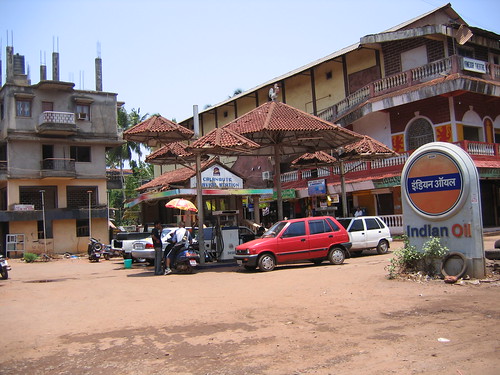I grew up hearing stories about the Bengal Famine of 1943-45, hearing about them from my mother about how close to four million people died due to what was essentially a man made tragedy as food grains were diverted by the British Indian Government to feed the Allied Armies and the war effort, putting civilian lives at a much lower priority. My mother recounts stories of how food was scarce but unavailable as the prevailing shortages and black marketing and hoarding made it unaffordable for most of the farmers who actually grew the food in the first place. Wealthy families who could afford to still buy would often cook a little extra, running soup kitchens of a kind for those who turned up at their doors.
Hearing and reading about the food riots in various parts of the world makes one wonder if the man made famines are coming back to haunt us again. Food riots have already been reported in Haiti, Ivory Coast, Cameroon, Mozambique, Senegal, Uzbekistan, Yemen, Bolivia and Indonesia. India thus far has been spared because the country has been self sufficient in food but the impact sooner or later will be felt here too no doubt with inflation making food grains inaccessible to many, especially those out of the ambit of the revamped public distribution system or the various employment guarantee schemes.
But what is worrying now is not that food shortages are happening but the reasons why they are happening and the fact that unlike the famine victims of the 1940s, who were largely ignorant of the causes as well as ignorant of the way, they could protest, today’s generation is empowered enough to make their voice heard but not necessarily knowledgeable enough to reverse powerful processes that seem driven by irreversible policy imperatives
Here is the grim scenario of how the post modern Frankenstein is playing out :
“Briefing media persons in New Delhi on Wednesday, the director-general of UN Food and Agriculture Organization (FAO), Jacques Diouf said: “World food prices have risen 45% in the last nine months and there are serious shortages of rice, wheat and maize.” He singled out bio-fuel programme as one of the major contributing factor to the global price rise as it has caused diversion of farmland from food to fuel crops and the prices of bio-fuels which scaled up in tandem with the prices of fossil fuels in turn affected the food prices.”
Now with the prices of crude oil consistently rising and trading for long at prices of over at one hundred dollars a barrel, it is imperative to look for alternative beyond fossil fuels. And the search for an alternative seems to have zeroed in on bio fuels wherein farmers once enticed by cash crops to abandon staples are now being enticed to grow food product but use them not for food but to produce fuel. And so farmers in several parts of the world including the USA have increasingly switched to producing corn for the purposes of producing ethanol. This has obviously reduced the area available for cultivation for crops like wheat and diversion of corn from the market place to the refinery. Climate change over the years has also begun to affect farm yields.

In India, the government has mandated the blending of ten percent ethanol in all petrol to be marketed from October. Apart from technical issues (Germany has scrapped a similar program finding it unviable); there is the question of where this ethanol is going to come from. If it is going to come from domestic sources, then it would mean that in India too, land would come from that part of the agricultural land that is currently being used for growing food grains. This along with the fact that increasingly needs for infrastructure are being met by acquiring agricultural land (West Bengal being a well known case in point) means that food grain production in India will decline. India’s food grain production could fall 11 million tonnes short of the target of 220 million tones according to the pre budget economic survey presented before the budget.
Caught between the need to feed its people and the need for energy to transport people and goods, it seems that not just India but just the world itself is caught between a rock and a hard place. The tragedy is that in earlier days, thought the effects of famine were colossal, they were localized and temporary and with the right kind of political will, they could be handled in part, because if parts of the world had food shortages, there were other parts of the world that had surpluses and imports or food aid could be arranged. The news this time round is that the shortages of food could be global and there simply may not be enough food any where in the world that is available for import. That the whole world could be headed for a chronic and slow famine with some of the environmental tinkering that we have done apparently irreversible in the short haul at least is a grim thought.



No comments:
Post a Comment